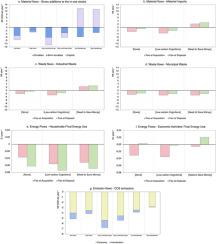Shaping sustainable consumption practices: Changing consumers’ habits through lifestyle changes and Extended Producer Responsibility schemes
IF 10.9
1区 环境科学与生态学
Q1 ENGINEERING, ENVIRONMENTAL
引用次数: 0
Abstract
This paper studies Japan's consumer-side circular economy strategies, particularly focusing on the Extended Producer Responsibility (EPR) systems. The current low rates of EPR fees limit their effectiveness in promoting sustainable consumption and production practices. The study investigates how increasing EPR fees might alter Japanese household sufficiency behaviors under different lifestyle change assumptions. Using a socio-economic approach, it assesses how adjusting EPR fees can influence consumer behavior and environmental outcomes, contributing to a sustainable circular economy. The findings suggest higher EPR fees on energy-using durable goods encourage circular consumption, especially on consumers with strong cognitive intentions towards circular economy behaviors. Behavioural policies promoting environmental awareness are important enablers. In addition, the timing of EPR fee imposition (at acquisition vs. disposal) significantly affects the policy outcomes. While the policy can slow resource loops for some products, its impact on CO2 emissions may be limited.

塑造可持续消费实践:通过改变生活方式和扩大生产者责任计划改变消费者的习惯
本文研究了日本的消费者侧循环经济战略,特别关注生产者延伸责任(EPR)制度。目前较低的环境责任费率限制了其在促进可持续消费和生产做法方面的效力。该研究调查了在不同的生活方式改变假设下,增加EPR费用可能如何改变日本家庭的自给自足行为。利用社会经济方法,它评估了调整EPR费用如何影响消费者行为和环境结果,从而为可持续循环经济做出贡献。研究结果表明,对耗能耐用品征收更高的EPR费用会鼓励循环消费,尤其是对那些对循环经济行为有强烈认知意向的消费者。促进环境意识的行为政策是重要的促成因素。此外,征收EPR费用的时间(在收购与处置时)显著影响政策结果。虽然该政策可以减缓某些产品的资源循环,但其对二氧化碳排放的影响可能有限。
本文章由计算机程序翻译,如有差异,请以英文原文为准。
求助全文
约1分钟内获得全文
求助全文
来源期刊

Resources Conservation and Recycling
环境科学-工程:环境
CiteScore
22.90
自引率
6.10%
发文量
625
审稿时长
23 days
期刊介绍:
The journal Resources, Conservation & Recycling welcomes contributions from research, which consider sustainable management and conservation of resources. The journal prioritizes understanding the transformation processes crucial for transitioning toward more sustainable production and consumption systems. It highlights technological, economic, institutional, and policy aspects related to specific resource management practices such as conservation, recycling, and resource substitution, as well as broader strategies like improving resource productivity and restructuring production and consumption patterns.
Contributions may address regional, national, or international scales and can range from individual resources or technologies to entire sectors or systems. Authors are encouraged to explore scientific and methodological issues alongside practical, environmental, and economic implications. However, manuscripts focusing solely on laboratory experiments without discussing their broader implications will not be considered for publication in the journal.
 求助内容:
求助内容: 应助结果提醒方式:
应助结果提醒方式:


